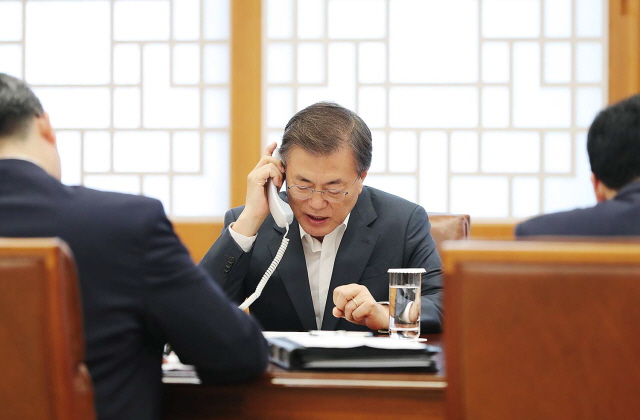이 웹사이트는 제19대 대통령 임기 종료에 따라 대통령기록관이 「대통령기록물 관리에 관한 법률」에 의해 이관받아 서비스하는 대통령기록물입니다. 자료의 열람만 가능하며 수정 · 추가 · 삭제는 불가능합니다.
다만, 「개인정보보호법」에 의하여 개인의 정보를 보호받기 원하시는 분은 관련 내용(요청자, 요청내용, 연락처, 글위치)을 대통령 웹기록물 담당자(044-211-2253)에게 요청해 주시면 신속히 검토하여 조치해 드리겠습니다. 감사합니다.
SPEECHES & REMARKS
BRIEFINGS

President Moon Jae-in and Japanese Prime Minister Shinzo Abe spoke over the phone from 4:00 this afternoon. During their 23-minute telephone conversation, the two leaders shared an understanding about the grave security situation on the Korean Peninsula following the series of recent provocations by North Korea. They also engaged in an in-depth discussion on how Korea and Japan should work together to respond to such provocations.
President Moon and Prime Minister Abe held a common view that the sophistication of North Korea’s missile capabilities and its back-to-back missile launchings were posing severe threats to peace and stability not only on the Korean Peninsula but also in all of Northeast Asia.
The two leaders expressed gratification that Korea, Japan and the United States were working closely together on both the bilateral and trilateral level based on a common understanding and sternly responding to the North’s provocations and threats.
Moreover, President Moon and Prime Minister Abe noted the United Nations Security Council’s adoption in a plenary session early in the morning yesterday of the toughest and most comprehensive sanctions resolution ever against North Korea with unanimous consent, including that of China and Russia.
The two leaders reached an agreement to continue to work closely together to ensure that this resolution would serve as a catalyst for inducing substantive changes in North Korea by implementing it to the letter based on the cooperation of the international community.
In this connection, they echoed the need for Korea and Japan to closely consult each other and steer North Korea toward making the right choice of giving up its nuclear and missile programs by applying maximum pressure and sanctions on the North in cooperation with the international community.
President Moon and Prime Minister Abe noted that close consultations and cooperation between the National Security Councils as well as foreign affairs and defense authorities of both nations had taken place immediately after North Korea’s strategic provocations on July 4 and 28. In preparation for the possibility that North Korea might carry out another provocation around the time of the ROK-U.S. joint military exercise scheduled for late August, the two leaders agreed to the continuation of cooperation between Korea and Japan and among Korea, the United States and Japan to deter and respond to any additional provocation.
The two leaders shared an understanding that it was necessary to toughen pressure and sanctions against North Korea in the current situation under which the North continued its provocations and showed no sign of willingness to engage in dialogue.
Noting that the North Korean nuclear and missile problem needed to be solved ultimately through negotiations and peaceful and diplomatic means, President Moon said Korea and Japan, and Korea, the United States and Japan should discuss strategic plans to bring the North back to the negotiating table for the complete dismantlement of its nuclear program. Furthermore, the President made a comment on the need for close trilateral cooperation in the months to come.
Prime Minister Abe said that it was only natural to have dialogue in the end to resolve the North Korean nuclear and missile problem. He continued to note that the two leaders shared an understanding that for now, however, it was necessary to put pressure on the North for it to come forward and accept dialogue.
Prime Minister Abe expressed his gratitude to President Moon for extending his congratulations on the launch of the third cabinet in Japan on August 3. The Prime Minister said he hoped that the two sides would closely cooperate to further develop Korea-Japan relations along with newly appointed Minister of Foreign Affairs Taro Kono.
Prime Minister Abe said he was delighted that a cooperative relationship between the two countries could be established under President Moon’s leadership, adding that he hoped that President Moon would be able to visit Japan at the earliest date possible as part of shuttle diplomacy. President Moon responded that to revitalize shuttle diplomacy, a mutually convenient time could be arranged at the working level, adding that he hoped they would meet each other at the Eastern Economic Forum to be held in Vladivostok in early September.
The two leaders said the phone conversation today was very beneficial and agreed to continue close consultations through various means, including frequent phone calls, in the months to come.



